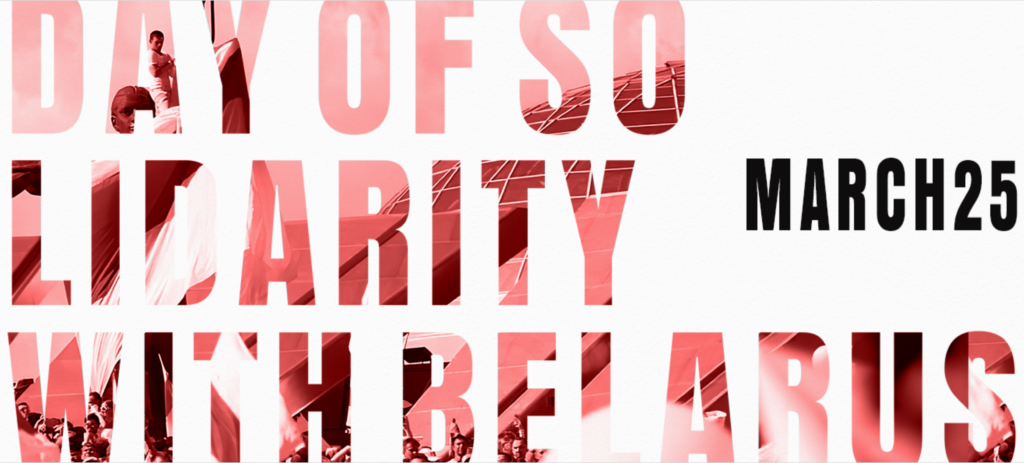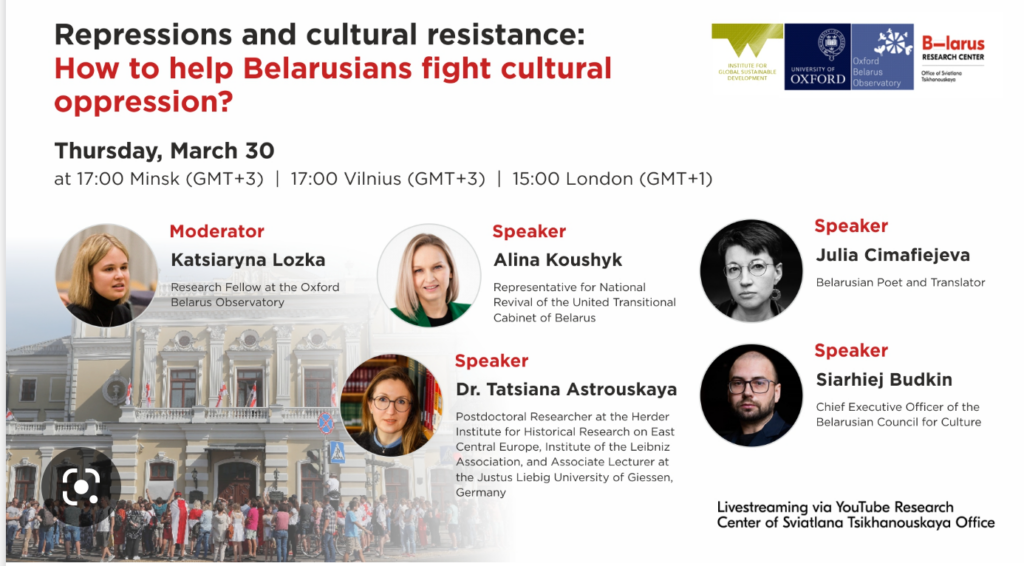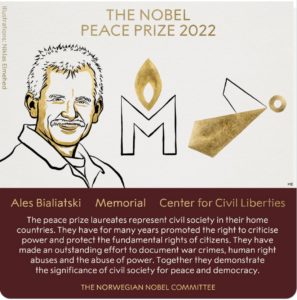
A court in Belarus on Thursday sentenced a reporter for the now-closed local edition of one of Russia’s most popular newspapers to three years in prison for insulting the country’s authoritarian leader, AP reports:
Hienadz Mazheyka was sentenced for a 2021 article in Komsomolskaya Pravda that cited an acquaintance of a man killed in a police raid as speaking favorably of him. The story angered President Alexander Lukashenko, who has suppressed opposition and criticism with increasing severity….. The Belarusian Association of Journalists says there are 36 journalists either imprisoned or in detention awaiting trial.
“The situation with free speech in Belarus is the worst in Europe and the retaliation against Mazheyka only confirms that,” said journalists’ association head Andrei Bastunets.
Sviatlana Tsikhanouskaya invites you to join the International Day of Solidarity with Belarus on March 25.
 Some 37 participating States today invoked the OSCE’s Moscow Mechanism over deteriorating human rights in Belarus.
Some 37 participating States today invoked the OSCE’s Moscow Mechanism over deteriorating human rights in Belarus.
“This new invocation will establish an expert mission to look into the human rights situation in Belarus and mounting evidence of the Lukashenka regime’s brutal crackdown on all elements of Belarusian society since 2020, as well as allegations of serious abuses linked to the Lukashenka regime’s complicity in Russia’s war of aggression against Ukraine,” said the US State Department’s Vedant Patel. “The expert mission will have a mandate to assess Belarus’s adherence to its OSCE commitments and how the Lukashenka regime’s actions may have adversely affected Belarus’s civil society, press freedoms, the rule of law, and the ability of democratic processes and institutions to function.”
This week’s Kalinowski Conference discussed the future of Belarus as well as the importance of upholding democratic values in the face of authoritarianism, Euro-Atlantic integration and democratic development in the region.
Belarusian opposition leader Sviatlana Tsikhanouskaya tells the Atlantic Council how the West can support freedom and self-determination in Belarus and describes the effect of Russia’s invasion of Ukraine on the Belarusian democratic opposition and civil society (above).
 President Alexander Lukashenko has ramped up his brutal repression with a series of raids on opposition leaders and a string of politically motivated jailings that has led the UN to accuse his regime of “crimes against humanity,” according to BNE Intelligence:
President Alexander Lukashenko has ramped up his brutal repression with a series of raids on opposition leaders and a string of politically motivated jailings that has led the UN to accuse his regime of “crimes against humanity,” according to BNE Intelligence:
The Ministry of Internal Affairs conducted over a 100 searches as part of the sweep looking for “terrorists” that was ordered by Lukashenko after a recent attack damaged a Russian long-range radar aircraft A-50 stationed at the Machulishchy airfield outside Minsk.
This month, both the ILO Governing Body and the UN High Commissioner for Human Rights (OHCHR) have made strong statements on the human rights situation in Belarus, calling on the government to stop persecuting those involved in independent trade unions in the country, Industriall adds.
 What to Make of the Escalating Repressions in Belarus? analyst asks in the Eurasia Daily Monitor.
What to Make of the Escalating Repressions in Belarus? analyst asks in the Eurasia Daily Monitor.
The American Enterprise Institute for Public Policy Research hosts a discussion on “The Fight for European Democracy” with Sviatlana Tsikhanouskaya, Belarus opposition leader; and Antonia Ferrier, vice president of external affairs at the International Republican Institute.
4 p.m. March 27, 2023. AEI, 1789 Massachusetts Avenue NW, Auditorium, Washington, D.C. RSVP
The cultural sphere in Belarus is facing unrelenting repressions. From arrests of cultural figures to attacks on the Belarusian language and traditions, the level of repressions and cultural destruction have not decreased since 2020, the Research Center of Sviatlana Tsikhanouskaya observes. Dozens of cultural workers remain behind the bars, hundreds were forced to flee. Many cultural civil society organisations were liquidated. Nevertheless, in the context of continuous repressions and war, a resistance movement empowered by artists, writers, and musicians persists. These experiences and practices of cultural resistance have deep historical roots.
 How do Belarusians inside and abroad fight for their cultural and historical heritage? To what extent is the current period of Belarusian resistance comparable with earlier periods, including the Soviet times? How do culture and art help to resist the dictatorship? What support do cultural workers need and what challenges do they face? Finally, what could be their role in overcoming the trauma of repressions and exile today and in post-authoritarian Belarus? These and other questions will be discussed in a panel discussion organised by the Oxford Belarus Observatory, in partnership with the Research Center of Sviatlana Tsikhanouskaya Office, and the IGSD, University of Warwick.
How do Belarusians inside and abroad fight for their cultural and historical heritage? To what extent is the current period of Belarusian resistance comparable with earlier periods, including the Soviet times? How do culture and art help to resist the dictatorship? What support do cultural workers need and what challenges do they face? Finally, what could be their role in overcoming the trauma of repressions and exile today and in post-authoritarian Belarus? These and other questions will be discussed in a panel discussion organised by the Oxford Belarus Observatory, in partnership with the Research Center of Sviatlana Tsikhanouskaya Office, and the IGSD, University of Warwick.
Join next week’s webinar on “Repressions and cultural resistance: How to help Belarusians fight cultural oppression” Thursday, March 30 at 17.00 Minsk | 17.00 Vilnius | 15.00 London. RSVP
Today’s #Kalinowski Conference discussed the future of #Belarus—but also the importance of upholding democratic values in the face of authoritarianism, Euro-Atlantic integration, & democratic development in the region @DamonMacWilson @Tsihanouskaya @SpeakerPelosi @ZygisPavilionis pic.twitter.com/o1mPxN1RpP
— NEDemocracy (@NEDemocracy) March 24, 2023







